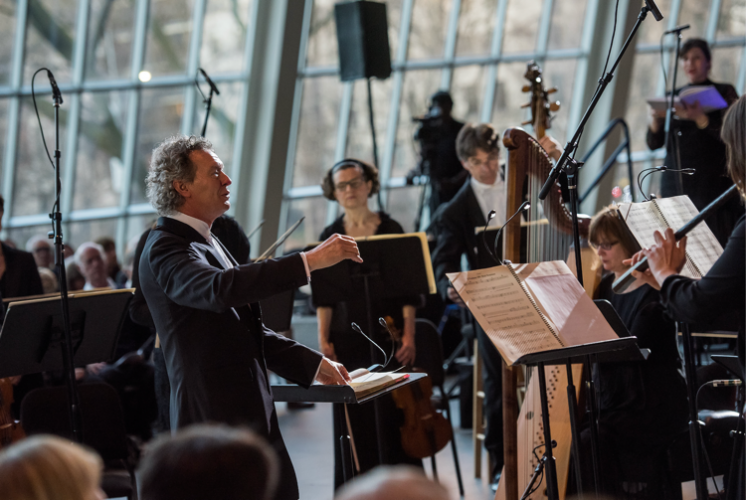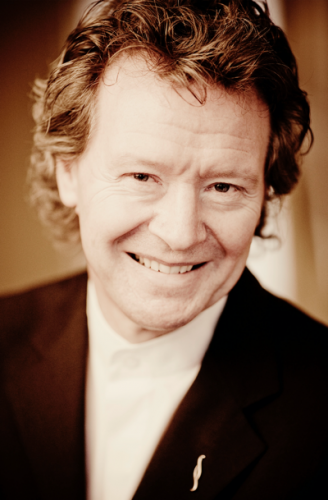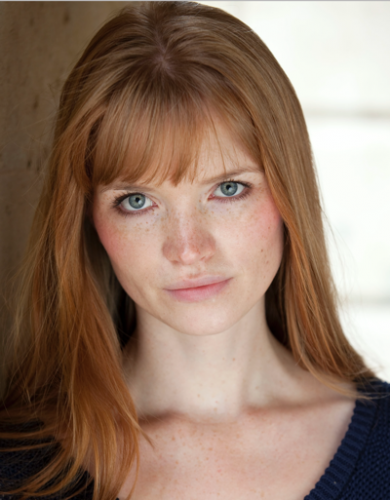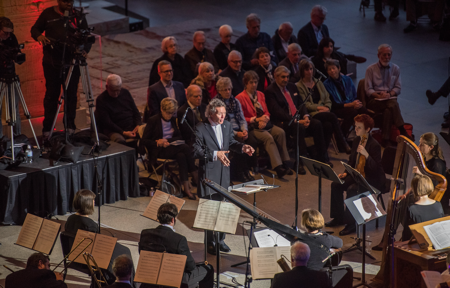
(Photo by Stephanie Berger)
By Keith Powers
BOSTON — “You should see my face right now,” says Harry Christophers. “I’m positively beaming all over, just talking about it.”
What the Handel and Haydn Society’s artistic director is beaming about is Purcell’s The Fairy-Queen — “He’s just one of those composers I feel a great affinity for,” he says — which H+H will perform Aug. 9 in a long-overdue appearance in Ozawa Hall at Tanglewood.

For a Boston institution like H+H not to visit the summer home of another of the city’s musical institutions — the Boston Symphony Orchestra — for 20 years seems an injustice. But it’s true: the last H+H appearance on the bucolic Tanglewood grounds was in 1997, when the two-centuries-old period ensemble performed with the late mezzo-soprano Lorraine Hunt (Lieberson) and baroque violinist Stanley Ritchie.
It’s high time to right that wrong, and Christophers has chosen Purcell’s fanciful adaptation of A Midsummer Night’s Dream to celebrate H+H’s return. Based on the wedding scene — you know, Titania and the love potion, and the hilarious amours with an ass that follow — Purcell’s realization has charm, comedy, and, above all, lovely music. H+H is bringing its period orchestra, a chorus of nine singers, and narrator Antonia Christophers along for the semi-staged performance.
Narrator and conductor share a last name because they are daughter and father. But Antonia Christophers doesn’t have to share a famous family name to be well-known: her children’s theater company, Box Tale Soup, which adapts classic works of literature (Wind in the Willows, The Picture of Dorian Gray), tours the world. She’s also an in-demand actor, and her role as Mhaegen in the first season of HBO’s Game of Thrones might attract the cosplay audience to Ozawa Hall.
“She’s also a trained Shakespearean,” her father points out, “and while she’s not directing this entire performance, she’s going to direct a couple of things — the drunken poet, and the marriage sequence — the scenes that need a little stagecraft.”
Antonia Christophers will narrate Jeremy Sams’s adapted script. Purcell’s work falls into the category of masque, or semi-opera: a narrator weaves the tale, while musical interludes interrupt to color the story in metaphorical, allegorical or historical ways.
The Fairy-Queen — no connection to Spenser’s great epic — was first staged in 1692, popular for a few years, and then lost entirely until the 20th century. Since then it has seen multiple revisions, stagings, and recordings, including versions by Benjamin Britten, John Eliot Gardiner, William Christie, Ton Koopman, and Harry Christophers himself — a 1993 recording with his other ensemble, The Sixteen.
The original staging was at the Queen’s Theater, Dorset Garden, in London, a lavish affair by Christophers’s account. “This production must have broken the bank back in the day,” he says. “Just think of Dorset Gardens — the theater had a river running through it, with swans. It had peacocks. It had a Chinese garden. You can imagine it was glorious, absolutely glorious.

“We’re not bringing peacocks,” he continues, although you can actually visualize the Tanglewood grounds being set up for such a spectacle. “But we have the ability to revel in his music.”
That’s where the beam in Christophers’s countenance comes in. “Purcell isn’t really setting a single word of Shakespeare,” he says. “He’s conjuring up all the secrecy and charm in the play. Every part is important here — phenomenal polyphony and harmonies. And I dare you to find better viol parts. I’m using fewer strings — Purcell had 24, I’ll have 12 — but I’m keeping the same balance between the instruments.
“It’s amazing the detail in this music. You can spend hours rehearsing one of the dances, paying the right attention to the phrasing. And the cadences are so important to Purcell — not just the penultimate chords before the end, but even back to two bars before the end. Every part is individual. With many composers you can work in waves of dynamics. Not with Purcell: the waves have different waves. It’s never just basic counterpoint and polyphony — it’s more than that.”
The strings in this production are complemented by recorders (doubling oboes), percussion, theorbo (doubling guitar), and horns. Countertenor Robin Blaze (as Mopsa) and bass-baritone Matthew Brook (in multiple roles, including the Drunken Poet) step out of the chorus for solo roles.
Ian Watson, who conducted a couple of smaller runout versions of the H+H production earlier this summer from the harpsichord, “gets to sit and focus on the continuo this time,” Christophers says, “while I try to figure out what a conductor does.”
Antonia Christophers drives the action, and interacts in her own antic way as the narrator — who frequently takes Titania’s voice — with the musicians. “Jeremy Sams uses Titania as a guide through the masques,” she says. “As an actor, it’s not restrictive being a narrator, just different. Jeremy has written a bit of stage direction, and there’s a lot of fun to be had. There will be some interplay between daddy and I, some little moments where Titania tries to take over. It’s a clever narration, in that it sets everything up and then lets the music take control. My father will decide on any musical finessing, but my job is to make sure I enhance the pace. I don’t sing professionally — although I do get to join in at the end — but the narration gets almost sung in a spoken way. As you can imagine, growing up in my household, there was always lots of music going on. The Fairy-Queen was one of our favorites.”
For Harry Christophers, it’s a return to a place in the Boston family — of orchestras. And in general it’s a chance to forward H+H’s mission.

“We’re lucky in Boston to have so many organizations, and such a wonderful public. I’m sure that this appearance will renew our relationship, and that it can continue from now on. Taking the orchestra to new places — those things have a huge impact. Fairy-Queen is the perfect repertoire for Tanglewood, and the summertime. That’s why I chose it. We are out to prove that Baroque period music is not just about academia. It’s about entertainment. We are entertainers — I tell our singers this all the time — and we are here to make people cry out with joy, and be part of the emotions onstage.
“I’ve been hearing this talk about how the concert hall is dead, that it’s the noose around the neck of classical music. That you have to find funky new places to reach audiences — pubs, and the like. No no no no no, I say. There’s been an upsurge in young people coming to concerts, and this Purcell is whacky stuff. You have to do the very best you can, at what you do. That’s the standard I set for H+H, and why it deserves to be heard by a wider audience.”
The Handel and Haydn Society, led by Harry Christophers, performs Purcell’s The Fairy-Queen on Aug. 9 at 8 p.m. in Ozawa Hall at Tanglewood. For tickets ($12-$124) and information, go here or call 888-266-1200.
Keith Powers covers music and the arts for GateHouse Media and WBUR’s ARTery. Follow @PowersKeith; email to keithmichaelpowers@gmail.com

